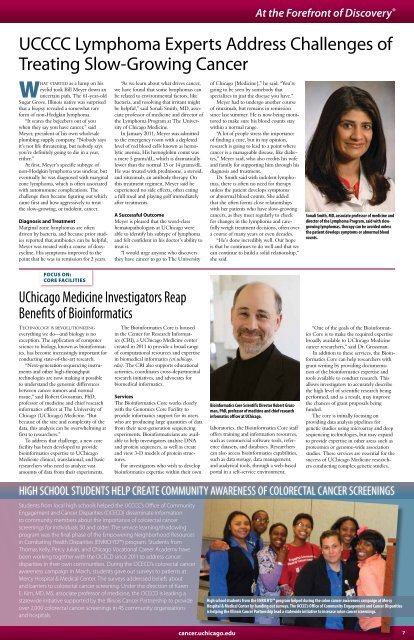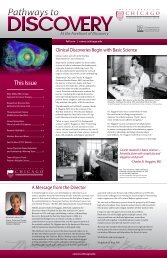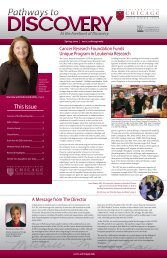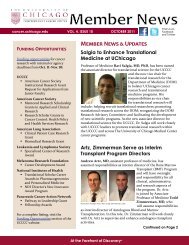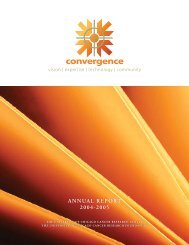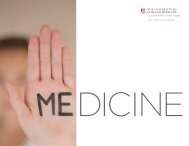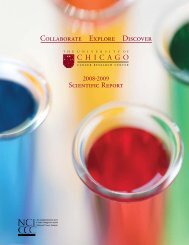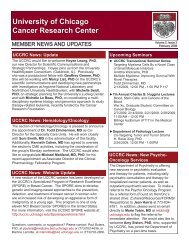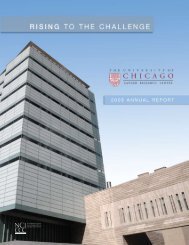Summer 2012 - The University of Chicago Medicine Comprehensive ...
Summer 2012 - The University of Chicago Medicine Comprehensive ...
Summer 2012 - The University of Chicago Medicine Comprehensive ...
- No tags were found...
Create successful ePaper yourself
Turn your PDF publications into a flip-book with our unique Google optimized e-Paper software.
At the Forefront <strong>of</strong> Discovery ®UCCCC Lymphoma Experts Address Challenges <strong>of</strong>Treating Slow-Growing CancerWhat started as a lump on hiseyelid took Bill Meyer down anuncertain path. <strong>The</strong> 61-year-oldSugar Grove, Illinois native was surprisedthat a biopsy revealed a somewhat rareform <strong>of</strong> non-Hodgkin lymphoma.“It scares the bejeebers out <strong>of</strong> youwhen they say you have cancer,” saidMeyer, president <strong>of</strong> his own wholesaleplumbing supply company. “Nobody saysit’s not life threatening, but nobody saysyou’re definitely going to die in a year,either.”At first, Meyer’s specific subtype <strong>of</strong>non-Hodgkin lymphoma was unclear, buteventually he was diagnosed with marginalzone lymphoma, which is <strong>of</strong>ten associatedwith autoimmune complications. <strong>The</strong>challenge then became figuring out whichcame first and how aggressively to treatthe slow-growing, or indolent, cancer.Diagnosis and TreatmentMarginal zone lymphomas are <strong>of</strong>tendriven by bacteria, and because prior studiesreported that antibiotics can be helpful,Meyer was treated with a course <strong>of</strong> doxycycline.His symptoms improved to thepoint that he was in remission for 2 years.“As we learn about what drives cancer,we have found that some lymphomas canbe related to environmental factors, likebacteria, and resolving that irritant mightbe helpful,” said Sonali Smith, MD, associatepr<strong>of</strong>essor <strong>of</strong> medicine and director <strong>of</strong>the Lymphoma Program at <strong>The</strong> <strong>University</strong><strong>of</strong> <strong>Chicago</strong> <strong>Medicine</strong>.In January 2011, Meyer was admittedto the emergency room with a depletedlevel <strong>of</strong> red blood cells known as hemolyticanemia. His hemoglobin count wasa mere 5 grams/dL, which is dramaticallylower than the normal 13 or 14 grams/dL.He was treated with prednisone, a steroid,and rituximab, an antibody therapy. Onthis treatment regimen, Meyer said heexperienced no side effects, <strong>of</strong>ten eatinga full meal and playing golf immediatelyafter treatments.A Successful OutcomeMeyer is pleased that the word-classhematopathologists at U<strong>Chicago</strong> wereable to identify his subtype <strong>of</strong> lymphomaand felt confident in his doctor’s ability totreat it.“I would urge anyone who discoversthey have cancer to go to <strong>The</strong> <strong>University</strong><strong>of</strong> <strong>Chicago</strong> [<strong>Medicine</strong>],” he said. “You’regoing to be seen by somebody thatspecializes in just the disease you have.”Meyer had to undergo another course<strong>of</strong> rituximab, but remains in remissionsince last summer. He is now being monitoredto make sure his blood counts staywithin a normal range.“A lot <strong>of</strong> people stress the importance<strong>of</strong> finding a cure, but in my opinion,research is going to lead to a point wherecancer is a manageable disease, like diabetes,”Meyer said, who also credits his wifeand family for supporting him through hisdiagnosis and treatment.Dr. Smith said with indolent lymphomas,there is <strong>of</strong>ten no need for therapyunless the patient develops symptomsor abnormal blood counts. She addedthat she <strong>of</strong>ten forms close relationshipswith her patients who have slow-growingcancers, as they meet regularly to checkfor changes in the lymphoma and carefullyweigh treatment decisions, <strong>of</strong>ten overa course <strong>of</strong> many years or even decades.“He’s done incredibly well. Our hopeis that he continues to do well and that wecan continue to build a solid relationship,”she said.Sonali Smith, MD, associate pr<strong>of</strong>essor <strong>of</strong> medicine anddirector <strong>of</strong> the Lymphoma Program, said with slowgrowinglymphomas, therapy can be avoided unlessthe patient develops symptoms or abnormal bloodcounts.Focus on:Core FacilitiesU<strong>Chicago</strong> <strong>Medicine</strong> Investigators ReapBenefits <strong>of</strong> BioinformaticsTechnology is revolutionizingeverything we do––and biology is noexception. <strong>The</strong> application <strong>of</strong> computerscience to biology, known as bioinformatics,has become increasingly important forconducting state-<strong>of</strong>-the-art research.“Next-generation sequencing instrumentsand other high-throughputtechnologies are now making it possibleto understand the genomic differencesbetween cancer tumors and normaltissue,” said Robert Grossman, PhD,pr<strong>of</strong>essor <strong>of</strong> medicine and chief researchinformatics <strong>of</strong>ficer at <strong>The</strong> <strong>University</strong> <strong>of</strong><strong>Chicago</strong> (U<strong>Chicago</strong>) <strong>Medicine</strong>. “Butbecause <strong>of</strong> the size and complexity <strong>of</strong> thedata, this analysis can be overwhelming atfirst to researchers.”To address that challenge, a new corefacility has been developed to providebioinformatics expertise to U<strong>Chicago</strong><strong>Medicine</strong> clinical, translational, and basicresearchers who need to analyze vastamounts <strong>of</strong> data from their experiments.<strong>The</strong> Bioinformatics Core is housedin the Center for Research Informatics(CRI), a U<strong>Chicago</strong> <strong>Medicine</strong> centercreated in 2011 to provide a broad range<strong>of</strong> computational resources and expertisein biomedical informatics (cri.uchicago.edu). <strong>The</strong> CRI also supports educationalactivities, coordinates cross-departmentalresearch initiatives, and advocates forbiomedical informatics.Services<strong>The</strong> Bioinformatics Core works closelywith the Genomics Core Facility toprovide informatics support for its userswho are producing large quantities <strong>of</strong> datafrom their next-generation sequencingexperiments. Bioinformaticians are availableto help investigators analyze DNAand protein sequences, as well as createand view 3-D models <strong>of</strong> protein structures.For investigators who wish to developbioinformatics expertise within their ownBioinformatics Core Scientific Director Robert Grossman,PhD, pr<strong>of</strong>essor <strong>of</strong> medicine and chief researchinformatics <strong>of</strong>ficer at U<strong>Chicago</strong>.laboratories, the Bioinformatics Core staff<strong>of</strong>fers training and information resources,such as commercial s<strong>of</strong>tware tools, referencedatasets, and databases. Researcherscan also access bioinformatics capabilities,such as data storage, data management,and analytical tools, through a web-basedportal in a self-service environment.“One <strong>of</strong> the goals <strong>of</strong> the BioinformaticsCore is to make the required expertisebroadly available to U<strong>Chicago</strong> <strong>Medicine</strong>cancer researchers,” said Dr. Grossman.In addition to these services, the BioinformaticsCore can help researchers withgrant writing by providing documentation<strong>of</strong> the bioinformatics expertise andtools available to conduct research. Thisallows investigators to accurately describethe high level <strong>of</strong> scientific research beingperformed, and as a result, may improvethe chances <strong>of</strong> grant proposals beingfunded.<strong>The</strong> core is initially focusing onproviding data analysis pipelines forgenetic studies using microarray and deepsequencing technologies, but may expandto provide expertise in other areas such asproteomics or genome-wide associationstudies. <strong>The</strong>se services are essential for thesuccess <strong>of</strong> U<strong>Chicago</strong> <strong>Medicine</strong> researchersconducting complex genetic studies.High School Students Help Create Community Awareness <strong>of</strong> Colorectal Cancer ScreeningsStudents from local high schools helped the UCCCC’s Office <strong>of</strong> CommunityEngagement and Cancer Disparities (OCECD) disseminate informationto community members about the importance <strong>of</strong> colorectal cancerscreenings for individuals 50 and older. <strong>The</strong> service learning/shadowingprogram was the final phase <strong>of</strong> the Empowering Neighborhood Resourcesin Combating Health Disparities (ENRICH’D) program. Students fromThomas Kelly, Percy Julian, and <strong>Chicago</strong> Vocational Career Academy havebeen working together with the OCECD since 2011 to address cancerdisparities in their own communities. During the OCECD’s colorectal cancerawareness campaign in March, students gave out surveys to patients atMercy Hospital & Medical Center. <strong>The</strong> surveys addressed beliefs aboutand barriers to colorectal cancer screening. Under the direction <strong>of</strong> KarenE. Kim, MD, MS, associate pr<strong>of</strong>essor <strong>of</strong> medicine, the OCECD is leading astatewide initiative supported by the Illinois Cancer Partnership to provideover 2,000 colorectal cancer screenings in 45 community organizationsand hospitals.High school students from the ENRICH’D program helped during the colon cancer awareness campaign at MercyHospital & Medical Center by handing out surveys. <strong>The</strong> UCCCC’s Office <strong>of</strong> Community Engagement and Cancer Disparitiesis helping the Illinois Cancer Partnership lead a statewide initiative to increase colon cancer screenings.cancer.uchicago.edu 7


